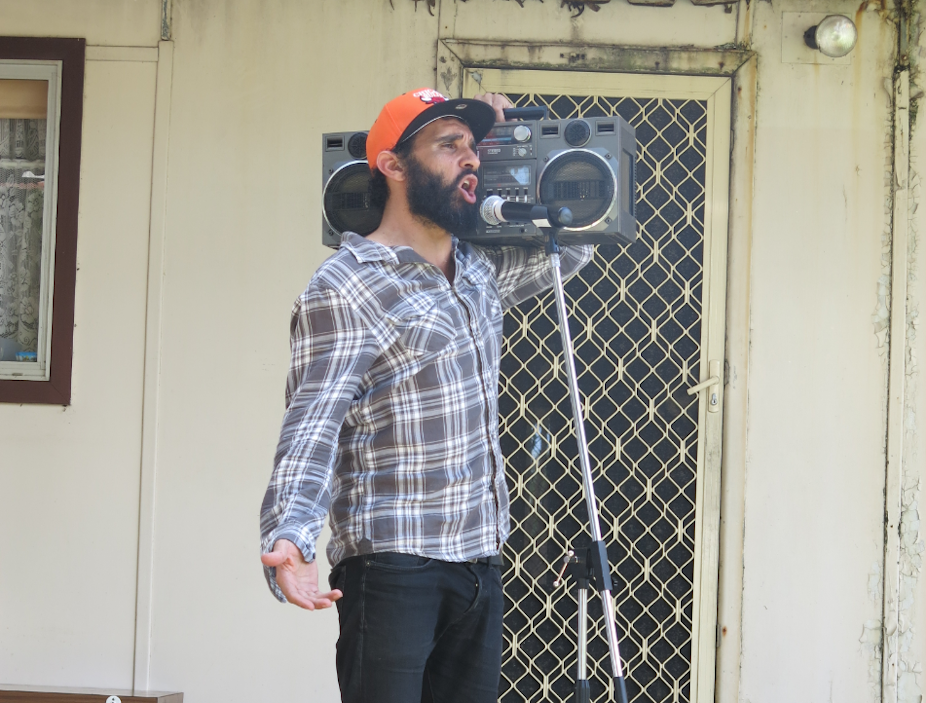This week, as part of Sydney Festival’s Bankstown: Live program, Michael Mohammed Ahmad will present a stage-adaptation of his debut novel. The Tribe, published in 2014, tells the story of three generations of an extended family and members of a small Muslim sect who fled to Australia just before the civil war in Lebanon.
Here, Ahmad, who is completing a PhD in creative writing at the University of Western Sydney and is director of Sweatshop: Western Sydney Literacy Movement, discusses why he wrote The Tribe, the identity politics of Arab-Muslim Australians and empowering marginalised communities through literacy.

What prompted you to write your novel The Tribe and who do you want to read it?
For the last two decades the representation of Arab-Australian Muslims has been coloured by media reports of terrorist conspiracy, sexual assault, drug-dealing and drive-by shootings. I wrote The Tribe in an attempt to step beyond these limited and simplistic images. I wanted to offer a complex and humanising portrayal of my community and culture, which as we have all learnt in recent months, is playing an increasingly important role in contemporary Australian society.
I wrote The Tribe for Australians.
Can you tell us a bit about what “the tribe” means in the book and the new play?
The Tribe is an autobiographical fiction that focuses on the relationships between three generations of my extended family, who fled to Australia before the Lebanese Civil War [1975-1990]. My family comes from a small sect in Islam that branches off from Shi’ism. I refer to this sect as “The Tribe” because so much of our customs and behaviours were distinctively tribal to me, in all our strengths and weaknesses.
These are traits I want audiences to experience as unique forms of Arab and Muslim identities, but more specifically and importantly, as one of the many intricate Australian identities.
Can you describe some of the work that Sweatshop does with young people in Western Sydney? Has this shaped your thinking with The Tribe?
Sweatshop is a literacy movement based in the University of Western Sydney Writing and Society Research Centre. Our work is devoted to empowering marginalised communities, particularly youth, in the region through literary programs that involve critical thinking and public outcomes such as publications and performances.
At the heart of Sweatshop is the call for self-determination – it is never about telling a person’s story, only about offering the tools for that person to tell their own story. African American cultural theorist bell hooks calls this “coming to voice – the act of moving from silence to speech as revolutionary gesture”.
The Tribe is my coming to voice.

We hear a lot about Western Sydney in the media – but not always from people who live in Western Sydney. What role is there for authors, playwrights and cultural organisations such as Sweatshop
Western Sydney is home to Australia’s largest populations of Indigenous, migrant and refugee communities, and how often do you hear the voices and see the faces of these people in mainstream literature, television, film, radio or theatre? We may spot them on the news, but always as the subject, never as the investigator.
There is a role, and indeed a right, for arts practitioners and arts organisations from Western Sydney to offer an alternative and self-determined representation of their home.
Why did you adapt The Tribe for the stage – and were there any big challenges in wrestling a novel onto stage?
As a novel, The Tribe draws literary influence from the ancient tradition of Arab oral storytelling – in style, structure, form and rhythm. It was naturally suited for the stage, but never as a traditional Australian play with multiple actors portraying various characters. The Tribe belongs to a single storyteller, who to pull this off I believe must channel the spirit of the Bedouin poet.
The challenge was finding the visionary team of artists who could approach the text with cultural sensitivity and who were willing to take a chance on Arab traditions of storytelling not familiar to Australian audiences. Janice Muller co-adapted the script with me and is directing, and Hazem Shammas is the sole performer who will bring the words to life. There is also Oonagh Sherrard doing sound. On opening night the critics can decide on our future and my ancestors can decide on our destiny.
The play will be performed in Bankstown, Western Sydney, where you grew up. Was this important to you?
In fact it will be performed from a backyard in Bankstown. When you’re sitting in that yard, and the words are flowing, while you breathe in the air and feel the sun set over you, you’ll know …
In the aftermath of the Martin Place siege in December and the Charlie Hebdo attack earlier this month in Paris, have you noticed a shift in the Australian media’s representation of the Muslim community?
In Islam we have a saying, “If you take one step toward Allah, Allah will take two steps toward you”. In Australia it seems as though our media and politicians take one step toward us and two steps back. After the Sydney siege we saw a genuine attempt to include and even protect Muslims as part of our national mourning, an effort to distance the actions of a sick individual from the rest of the Muslim community.
Then, when the Paris attacks took place, it seemed as though our news commentators and leaders became completely indifferent toward, and even supported, the desecration of our most sacred Islamic belief [the visual depiction of the prophet].
Freedom of speech is a freedom worth fighting for, but there are equally important freedoms – the freedom to love. We may be granted the right to offend, but out of respect we can always choose not to exercise that right. I call this freedom, “Taking a step toward each other”.
The Tribe will be performed as part of Bankstown Live at Sydney Festival from January 22-25, 2015.

